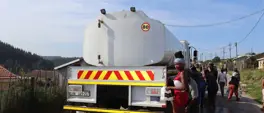Health Dept rolling out vaccine as SA experiences rise in German measles cases
Lauren Isaacs
8 September 2024 | 8:18Health officials are urging parents and caregivers to ensure that their children's routine immunisations are up to date.
CAPE TOWN - Several provinces are experiencing an increase in rubella, commonly known as German measles.
Health officials are urging parents and caregivers to ensure that their children's routine immunisations are up to date.
Rubella, which primarily spreads through respiratory droplets from coughing or sneezing, generally causes a mild illness in children and adults, characterised by a fever, rash, and sometimes joint pain.
Other symptoms include nausea, a sore throat, red eyes, and swollen lymph nodes in the neck.
In pregnancy, it also poses a potential risk to the developing baby.
The National Institute for Communicable Diseases (NICD) has alerted the Department of Health of a rising number of rubella cases in various parts of Gauteng, Western Cape, Eastern Cape, and KwaZulu-Natal.
"The department is currently rolling out the measles-rubella vaccine as part of the Expanded Programme of Immunisation across the country,” said the department’s Foster Mohale.
"This combined vaccine replaces the standalone measles vaccine and is administered at 6 and 12 months of age."
Seasonal increases in rubella are generally seen in South Africa between August and December.
According to a recent report by the NICD, more than 700 laboratory-confirmed rubella cases have been reported in the Western Cape between January and August 2024.
Get the whole picture 💡
Take a look at the topic timeline for all related articles.












